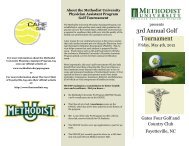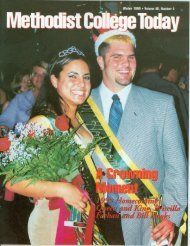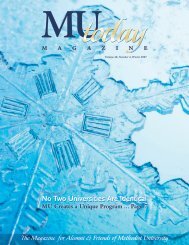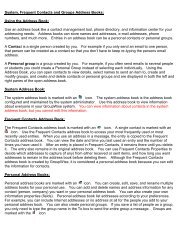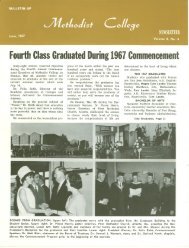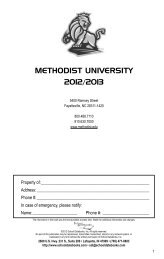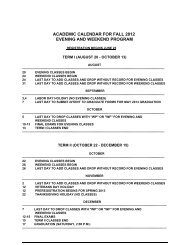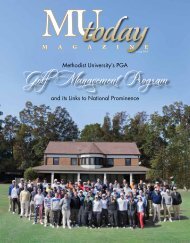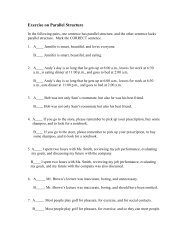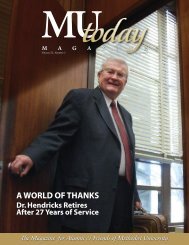Workshop 2 : Subject/Verb Agreement
Workshop 2 : Subject/Verb Agreement
Workshop 2 : Subject/Verb Agreement
Create successful ePaper yourself
Turn your PDF publications into a flip-book with our unique Google optimized e-Paper software.
Presents:<br />
The Dirty Dozen<br />
<strong>Workshop</strong> Series
<strong>Workshop</strong> Two:<br />
<strong>Subject</strong>/<strong>Verb</strong><br />
<strong>Agreement</strong>
Which sentence is<br />
correct<br />
Packing your own lunches save money.<br />
Packing your own lunches saves money.
Packing your own lunches save money.<br />
Packing your own lunches saves money.<br />
Why<br />
“Lunches” may look like the subject, but<br />
actually “Packing your own lunches” is<br />
what saves money, not the lunches<br />
themselves. Whenever such a verb phrase<br />
serves as the subject, consider it singular.<br />
Why does knowing the subject to be singular or plural matter
Rule of thumb: The subject<br />
and verb of each clause must<br />
agree in number.
What do we mean by<br />
“agree” & “number”<br />
When we talk about agreement, we mean making sure subjects<br />
and verbs agree in number— and in English, there are only two<br />
numbers: singular and plural.<br />
So, if you have a singular subject, you<br />
will need a singular verb. If you have a<br />
plural subject, you need a plural verb.
Singular<br />
<strong>Subject</strong><br />
Singular<br />
<strong>Verb</strong><br />
Correct!
Plural<br />
<strong>Subject</strong><br />
Plural<br />
<strong>Verb</strong><br />
Correct!<br />
Let’s take a closer look at those two sentences…
Packing your own lunches save money.<br />
Packing your own lunches saves money.<br />
The subject of each sentence is “Packing your own<br />
lunches”. This subject is singular; therefore, the verb<br />
must also be singular.<br />
“Saves” is a singular verb — a present tense singular<br />
verb to be precise. Most subject/verb agreement<br />
errors occur when dealing with these verbs. Why<br />
Because we intuitively think of “s” and “es” as plural.
Present tense verbs require an “s” or an “es” at<br />
the end of the verb when the subject<br />
performing the action is third-person singular<br />
(i.e. he, she, it) or is a word for which these<br />
pronouns could substitute (i.e. “girl” and<br />
“she” are interchangeable).<br />
Examples:<br />
She goes to town.<br />
He causes trouble.<br />
The girl thinks the earth is flat.
Tip: To determine whether a verb is singular<br />
or plural, ask which form of the verb you<br />
would use after the subject “it” and which<br />
form you would use with the subject “they”.<br />
Like this:<br />
It eats, sleeps, runs, wishes, dreams, loves<br />
They eat, sleep, run, wish, dream, love
“It” uses singular verbs.<br />
“They” uses plural verbs.
There are many rules of<br />
subject-verb agreement.<br />
Let’s look at them, starting<br />
with the most common.<br />
(All examples in this section are correct.)
A subject and a verb must agree,<br />
even when other words or phrases<br />
come between them.<br />
Example:<br />
The flock of geese is flying south<br />
for the winter.<br />
The subject is “flock,” so the verb should be “is<br />
flying.” Ignore the prepositional phrase “of geese”<br />
when determining verb number.
<strong>Subject</strong>s joined by “and”<br />
usually take a plural verb.<br />
Example:<br />
Dave and Bree went on a date.<br />
Exception: For phrases like “each girl and boy” or<br />
“every cat and bird,” where the subjects are considered<br />
individually, use a singular verb.<br />
Each actor and actress had a<br />
line in the play.
Collective nouns can either be<br />
singular or plural depending on<br />
the context of the sentence.<br />
Pssst! Collective nouns are words that<br />
refer to groups of people or things<br />
(e.g. class, family, jury, herd).
Rule of thumb:<br />
If the context of the sentence makes<br />
you visualize the group doing<br />
something together, as one unit,<br />
then the noun is singular and takes a<br />
singular verb.<br />
If you visualize different members<br />
of the group performing different<br />
actions, then the noun is plural and<br />
takes a plural verb.
Examples:<br />
The group agrees that new curtains<br />
would improve the space.<br />
(The group is acting as a unit, so the<br />
word group is singular.)<br />
The old group have gone their<br />
separate ways.<br />
(The group members are acting<br />
individually, so the word group is plural.)
The indefinite pronouns all, any,<br />
more, most, none, and some can be<br />
either singular or plural,<br />
depending on whether the word<br />
they refer to is singular or plural.
Examples:<br />
All the cupcake batter gets poured<br />
into a greased pan.<br />
(Here, “all” refers to “batter,” which is singular.)<br />
All the cupcakes are topped with<br />
cream cheese frosting.<br />
(Here, “all” refers to “cupcakes,” which is plural.)
The indefinite pronouns each, either,<br />
every, much, and neither require<br />
singular verbs.<br />
Example:<br />
Each of us has enormous<br />
potential to succeed in life.
The indefinite pronouns both, few,<br />
many, and several take plural verbs.<br />
Example:<br />
Both of us have enormous<br />
potential to succeed in life.
The verb must agree with its<br />
subject even when the subject<br />
follows the verb.<br />
Questions, sentences beginning with here or<br />
there, and sometimes sentences beginning with<br />
a prepositional phrase place the subject after<br />
the verb.
Examples:<br />
Is success measured by people’s wealth or<br />
their happiness<br />
Are wealth and happiness the same thing<br />
Walking down the street were three dogs<br />
and their owner.<br />
Here are my car keys.<br />
There is my uncle’s house.
<strong>Subject</strong>s that look plural (because<br />
they end in s) but refer to only one<br />
thing are singular.<br />
Examples:<br />
The lens is broken.<br />
Economics is a field of study.<br />
Psst! Many nouns ending in –ics (economics, statistics, and politics)<br />
take singular or plural verbs, depending on how they are used.
Some nouns (such as glasses, pliers,<br />
scissors, and trousers) are considered<br />
plural unless they are preceded by the<br />
phrase pair of.<br />
Example:<br />
My trousers require tailoring.<br />
This pair of trousers requires<br />
tailoring.
With subjects joined by or or nor, the verb<br />
should agree with the subject closer to it.<br />
Examples:<br />
Neither the principal nor the<br />
teachers like the new budget cuts.<br />
Either her brothers or Tammy waters<br />
the front lawn every day.<br />
Psst! For a more natural-sounding sentence, place the<br />
plural part of a compound subject second. Example: Either<br />
Tammy or her brothers water the front lawn every day.
Which verb correctly completes<br />
this sentence Remember, watch<br />
out for prepositional phrases in<br />
between subjects and verbs.<br />
The sale of apples and pears<br />
(accounts/account) for a large<br />
amount of the farmer’s income.
The sale of apples and pears accounts for<br />
a large amount of the farmer’s income.<br />
The sale of apples and pears account for<br />
a large amount of the farmer’s income.<br />
Remember rule #1: A subject and a verb must<br />
agree even when other words or phrases come<br />
between them. Frequently, prepositional phrases<br />
come between subjects and verbs. Ignore these<br />
prepositional phrases.
In the following pairs, one<br />
sentence is correct, and the<br />
other sentence has a subjectverb<br />
agreement error. Which<br />
sentence is correct<br />
A) My collection of silver spoons and tea<br />
sets often impresses others.<br />
B) My collection of silver spoons and tea<br />
sets often impress others.
A) My collection of silver spoons<br />
and tea sets often impresses others.<br />
B) My collection of silver spoons<br />
and tea sets often impress others.<br />
Why<br />
The subject is collection, which is a singular noun, so the<br />
verb must be singular. The correct verb is impresses.<br />
Remember, the object of the preposition (silver spoons<br />
and tea sets) is never the subject of the sentence.
Which verb correctly completes<br />
this sentence<br />
A) However, there is more luxurious<br />
accommodations in this hotel.<br />
B) However, there are more luxurious<br />
accommodations in this hotel.
A) However, there is more luxurious<br />
accommodations in this hotel.<br />
B) However, there are more luxurious<br />
accommodations in this hotel.<br />
Why<br />
Remember rule #7: The verb must agree with its<br />
subject even when the subject follows the verb.<br />
Questions, sentences beginning with here or there,<br />
and sometimes sentences beginning with a<br />
prepositional phrase, place the subject after the verb.<br />
Example: Here are several ideas.
In the following pairs, one<br />
sentence is correct, and the<br />
other sentence has a subjectverb<br />
agreement error. Which<br />
sentence is correct<br />
A) Here is the pole and bait that<br />
you will need to go fishing.<br />
B) Here are the pole and bait that<br />
you will need to go fishing.
A) Here is the pole and bait that<br />
you will need to go fishing.<br />
B) Here are the pole and bait that<br />
you will need to go fishing.<br />
Why<br />
Remember rule #2: Here the subject is<br />
compound (the pole and bait), which makes it<br />
plural. Therefore, the verb must also be plural.
Join us next time…<br />
Pronoun-Antecedent <strong>Agreement</strong> Errors



